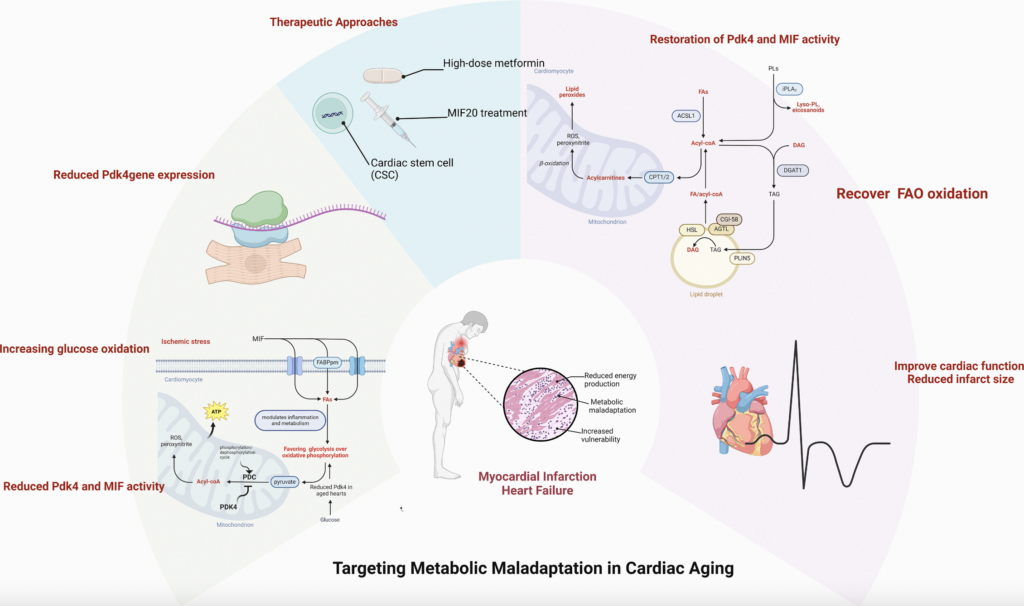Nadiyeh Rouhi, PhD student in Medical Physiology and Biophysics, Department of Physiology at the University of Mississippi Medical Center (UMMC), Jackson, MS, discusses an editorial she co-authored that was published by Aging (Aging-US) in Volume 16, Issue 16, titled “Cardiac Metabolism in the Elderly: Effects and Consequences.”
Behind the Study is a series of transcribed videos from researchers elaborating on their recent studies published by Aging (Aging-US). Visit the Aging (Aging-US) YouTube channel for more insights from outstanding authors.
—
Hi everyone. I am Nadiyeh Rouhi, PhD student, at the Physiology and Biophysics Department from University of Mississippi Medical Center. I’m so excited to share key findings from our recent research paper published by Aging titled, “Cardiac metabolism in the elderly: effects and consequences.” This work was a collaboration with Dr. Ji Li and Dr. Lozonschi and Mohammad Kasim Fatmi.
As you know, the prevalence of coronary artery disease and heart failure in the elderly is alarming as they remain the leading causes of death worldwide, unfortunately. Our motivation stemmed from a need to understand how age-related metabolic changes in the heart contribute to this condition and to explore a potential therapeutic avenue, and we want to know what is the mechanism behind this.
Our research revealed a critical maladaptation in cardiac metabolism post-myocardial infarction in the aged heart. Specifically, we found that the aged left ventricle continuously relies on glucose oxidation, on list fat oxidation, and this glucose oxidation is regulated by pyruvate dehydrogenase kinase 4, PDK4, leading to reduced cardiac output and progression toward heart failure.
Additionally, we discovered the macrophage migration inhibitory factor, MIF signaling – which modulates inflammation – and metabolism also diminished aged heart of regulating PDK4 and restoring MIF signaling with agnostic MIF20, demonstrated a promising result in improving cardiac output and reducing specifically infarct size. This is a highlighted pathway as a potential therapeutic target.
We continue to explore ways to optimize this therapeutic pathway and develop drugs that could enhance heart recovery after a heart attack and especially in elderly patients. In addition to protein therapeutic like MIF20, we are looking into treatments such as using stem cells and CRISPR case genes to promote heart repair.
Our findings are significant steps to our understanding of how age-related metabolic dysfunction contributes to heart failure and how we can address this issue to improve the quality of life for elderly patients. And specifically now, we are working to know the mechanisms of the metabolic response after heart attack or inflammation response after heart attack, which one comes first or which one triggers another one.
This is very important to understanding the mechanisms and the timeline of these consequences after heart attack, and ischemia reperfusion is the main stress which we are looking at as now the main regulation of this, and addressing these mechanisms is a very gold key to giving new therapeutic pathways.
And you can see in the graphic abstract of our paper, which very nicely shows how switching the heart myocardial cells from fatty acid oxidation, which is produced efficient ATP and energy, and the switch to glucose oxidation, which makes more stress and releasing more ROS and nitric oxide, which is both of this is the mechanism starting the myocardial dysfunction, especially starting inflammation dysfunction.
So we are happy to share this key finding and you can find our paper with this DOI and we are open to give and get any feedback, any comment. Thank you so much for giving interest to our research.
Click here to read the full study published by Aging (Aging-US).
—
Aging (Aging-US) is an open-access journal that publishes research papers bi-monthly in all fields of aging research and other topics. These papers are available to read at no cost to readers on Aging-us.com. Open-access journals offer information that has the potential to benefit our societies from the inside out and may be shared with friends, neighbors, colleagues, and other researchers, far and wide.
For media inquiries, please contact [email protected].
